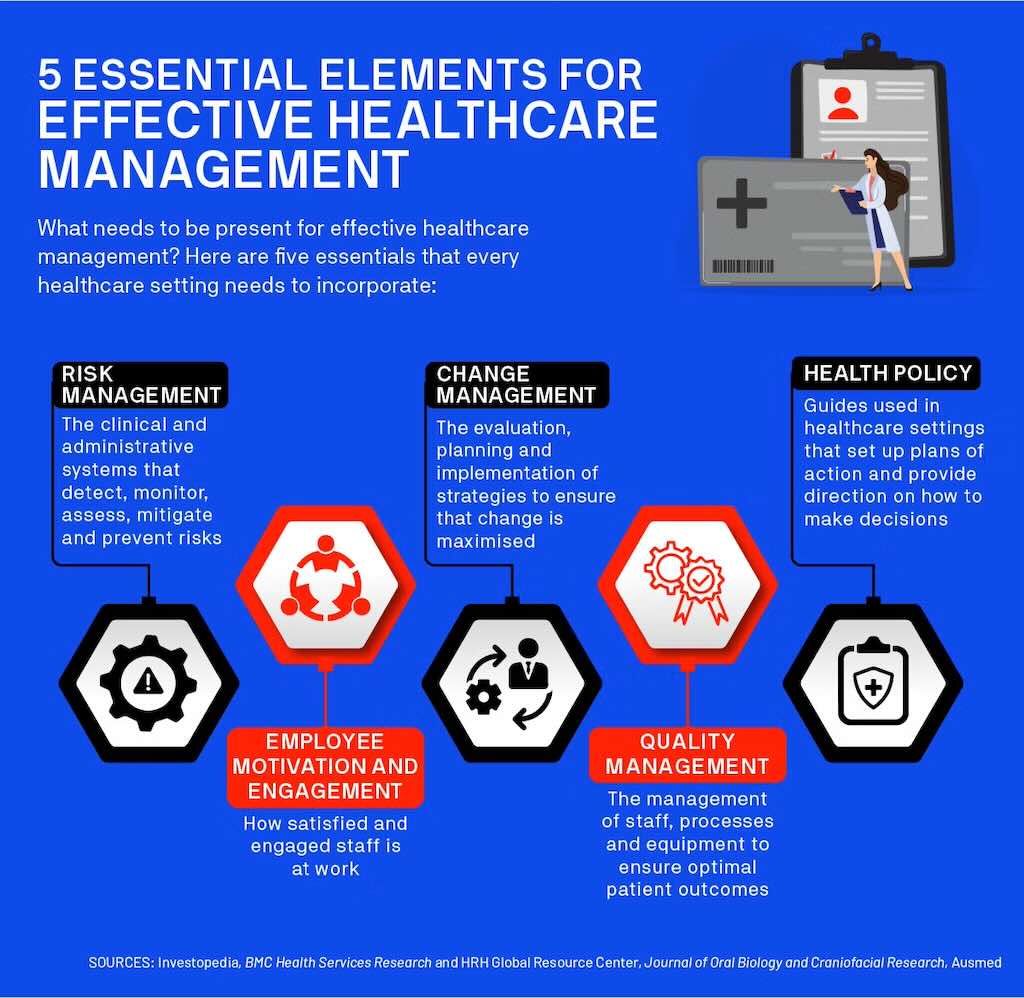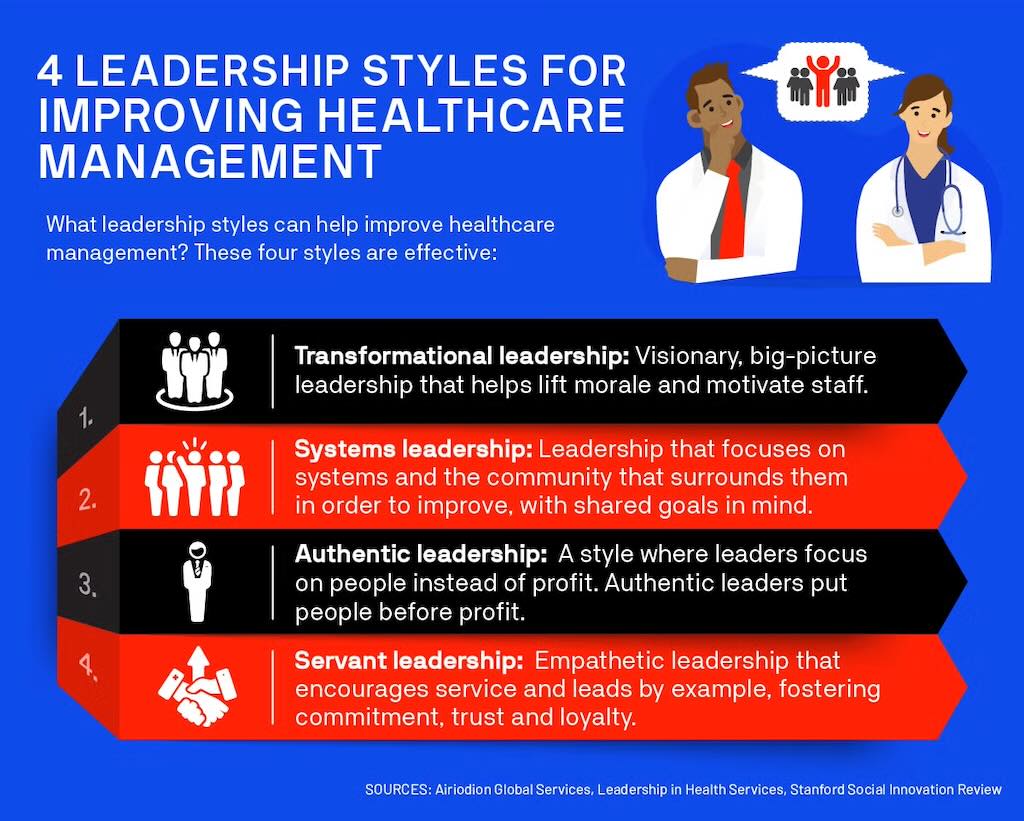Healthcare management: tips, tools and strategies for effective leadership


In an industry where the focus needs to be on optimal medical care at all times, one of the most important factors is effective leadership. When effective leadership is present in a healthcare setting, medical teams consistently deliver high-quality, compassionate patient and client care. In addition, staff productivity increases, as does team cohesion, overall staff professionalism, and the ability of staff and the organisation to manage change. Few things are needed more in healthcare settings than great leadership.
This article will delve further into why effective leadership in healthcare is important, as well as explore the five essential elements of effective healthcare management. We will then highlight the five leadership styles for effectively leading in healthcare and offer best practice tips for leadership. Finally, the article will detail further resources if you want to learn more about how to be an effective leader in this space.
Why is leadership in health services important?
Leadership in any organisation is critical because it shapes the culture, work practices, work quality and results. Leadership in health services is particularly important because all these factors can ultimately affect patient care, and the quality of patient care can literally be a matter of life and death.
Beyond the question of life and death, though, are the four key reasons that effective leadership in health services is important.
1. It encourages continuous development of skills
In a healthcare management setting, the continuous development of the staff's skills, knowledge and abilities is vital to ensure that patients receive the very best care.
Highly trained staff with up-to-date skills and qualifications are more likely to be equipped with knowledge of current medical practices and how to best handle difficult or unusual cases. Beyond this, though, the continuous development of skills gives medical staff the confidence that they are giving patients the best and most appropriate care. It also makes them feel valued and that their organisation deems them worthy of training and development.
Effective leadership in health services encourages the continuous development of skills, as leaders recognise the importance of investing in the training and development of staff.
2. It ensures that appropriate behaviours are modelled
Regardless of what codes of conduct organisations may have, behaviours are demonstrated from the top down. What this means is that if leaders display unprofessional or dissenting behaviours, staff will follow suit.
Effective leadership in health services is important to ensure that leaders who demonstrate professional and appropriate behaviours serve as role models to staff at all times. These professional behaviours should include showing respect for patients and their families and friends, showing empathy, and following protocol. Effective leadership also means not displaying unprofessional behaviours, such as socialising at the expense of patient care.
3. It helps foster a strong sense of team identity
Large healthcare settings (for example, hospitals and nursing homes) are, by nature, hierarchical in structure. They typically consist of many teams, with many people needing to work together effectively to provide exceptional patient care and look after many facets of patient needs. For this reason, a strong sense of team identity is important – something that effective healthcare management can provide.
When healthcare leaders are dynamic communicators, organisers and role models, and imbue a sense of purpose in their team, the healthcare team forms a strong identity. The team also becomes clearer on what good performance looks like and respects the appropriate chain of authority.
4. It encourages safe, high-quality and compassionate care for patients
Ultimately, effective healthcare management ensures the best outcome for patients and clients, meaning they receive safe, high-quality, compassionate care. Effective leadership in health services ensures this because successful healthcare leaders empower staff to provide the best care by offering support and training and actively working to solve problems and overcome challenges.
Effective healthcare leaders do whatever is necessary to give their staff the optimal conditions to succeed, and under these conditions, staff can deliver the best possible care.
For more information on why effective healthcare management is important, please see:
- Native News Online, 6 Reasons Why Leadership is Important in Healthcare
- HealthLeaders, Healthcare Leaders Reflect on 2020, Look Ahead to 2021
- HealthLeaders, In 2021, Health Leaders See Lingering Challenges and New Opportunities
Essential elements of effective healthcare management
From high-quality patient care to motivated staff and an optimal workplace, effective healthcare management is critical. What exactly does this look like, though?
Effective healthcare management comprises five essential elements.
1. Risk management in healthcare
The first essential element of effective healthcare management is risk management. Risk management in healthcare refers to managing clinical and administrative systems and processes in a way that will ensure that all risks are monitored, assessed, mitigated and prevented.
Traditionally, risk management in healthcare settings has been reactive and primarily focused on patient safety (for example, preventing negligence and associated legal ramifications). However, increasingly, the most effective leaders in healthcare services focus more broadly on risks to the entire healthcare ecosystem. This can involve the financial risks of delivering healthcare, as well as the risks from new medical science and ever-changing regulatory, legal and political climates.
2. Employee motivation and engagement
As employees in healthcare settings are the ones who are ultimately responsible for high-quality patient care, an essential element of effective healthcare management is ensuring that they stay motivated and engaged, even in the most stressful and challenging situations.
From a global perspective, employee engagement in the healthcare sector is above average. While this is promising, good healthcare leaders know that they always need to do more, and do better, with helping their employees feel emotionally committed; this commitment can often be the difference between life and death for patients, certainly contributing to overall patient well-being and safety. Effective leaders in healthcare services can help keep their staff motivated by offering above-average pay and conditions, if possible, and by investing in their team’s development.
3. Change management in healthcare
In a complex adaptive system like modern healthcare, nothing is more constant than change. Many processes and systems are becoming digitised, which is putting increasing pressure on staff to learn new ways of working. For this reason, change management in healthcare is extremely important.
Effective leaders in health services understand the importance of change management and incorporate change management best practices into everything they do. This involves constantly communicating with staff, providing thorough training, and leading by example in embracing new systems and processes.
4. Quality management in healthcare
The quality of care in a healthcare setting is critical, so quality management in healthcare, from the delivery of clinical care to sanitisation and effective rostering, is essential.
Quality management in healthcare can take many different forms. From a patient perspective, quality management refers to ensuring that all medical care that is provided is accessible, appropriate, available, effective, efficient and safe. From a healthcare professional perspective, quality management refers to having the skills, leadership, colleagues and tools available to provide patients with the very best care.
5. Health policies
Effective healthcare management involves delivering a consistent, easily understood level of care and always taking certain steps in different situations. In a healthcare setting, this framework for what to do and when, is best established through a series of health policies. For this reason, the final essential element in healthcare management is exceptional, well-communicated, accessible health policies.
Health policies should cover myriad situations, for example, what to do in different situations and how to do it, as well as degrees of authority over certain critical decisions. For example, a health policy may cover steps to be taken when a patient is in an emergency department and needs critical and lifesaving care.

Four leadership styles for improving healthcare management
Leaders in healthcare settings have many critical responsibilities. However, while the end results may be well-defined, how to achieve those results is less so.
Effective leaders in health services know that leading is not a one-size-fits-all proposition. They know that they will need to employ many different leadership styles to ensure that they achieve the outcomes they desire.
Here are four different leadership styles that the best leaders need to know how to employ to ensure optimal healthcare management.
1. Transformational leadership
Transformational leadership in healthcare management is a leadership style that helps employees understand how to take ownership of, and exceed expectations in, their roles. As opposed to assigning tasks, transformational leaders teach people how to think independently and find optimal ways of achievement. For example, transformational leaders within healthcare settings may encourage their team to find different ways to provide the best possible care, as opposed to stipulating how this care must be provided.
Transformational leaders are most effective in changing systems, solving problems, motivating their team and leading by example.
2. Systems leadership
A relatively new type of leadership, systems leadership is a leadership style that is well-suited to the complex challenges of healthcare management.
A leader who engages with systems leadership seeks to understand the systems and processes that surround them, and also the community that those systems are built around. They then engage stakeholders in complex discussions to map systems, build trust, and then act with accountability if they are to enact any changes. Any task or change enacted by a systems leader is done so with shared goals and principles in mind.
Systems leaders think broadly about their environment, the processes that surround them, and the people within the system that they operate.
3. Authentic leadership
Authentic leadership is a leadership style that is growing in popularity and one that has been embraced by leaders in and outside of healthcare. Authentic leaders place their emphasis on people and ethics over profit.
Authentic leaders are primarily those that are self-aware. They realise that their actions and decisions impact people, and seek to critically examine their own strengths and weaknesses so they can be the best leaders possible. They also lead with their heart, focus on long-term results, and are transparent and consistent in how they work with people around them.
Authentic leaders are people leaders with strong moral compasses who put others before themselves.
4. Servant leadership
The final type of leadership that is essential for effective healthcare management is servant leadership. Servant leaders are highly influential leaders who focus on motivating others, building relationships, and developing the skills of their team members, with the ultimate aim of inspiring them to lead. Servant leaders are very caring and aspire to provide each and every team member with the resources needed to succeed.
Servant leaders are particularly skilled at leading multidisciplinary teams and tend to be popular and well-respected.

For more information on leadership styles in healthcare services, please see:
- Nursing Standard, Understanding Effective Nurse Leadership Styles During the COVID-19 Epidemic
- Leadership in health services, Authentic leadership in healthcare: a scoping review
- Stanford social innovation review, The dawn of system leadership
- BMJ Leader, Reflections on leadership in the time of COVID-19
- Healthcare management forum, The mental demands of leadership in complex adaptive systems
Healthcare management leadership tips
With so much expected of leaders in healthcare, leaders can easily feel overwhelmed with what is required. Often, leaders seek out best practices for ensuring effective healthcare management.
Here are five best practices for all healthcare leaders.
1. Recognise talent and know how to retain it
Given the relationship between talented staff and high-quality patient care, finding talented healthcare employees is essential for healthcare leaders. Effective leaders in healthcare services must know how to recognise talent, including understanding both the technical and the soft skills that talented employees must hold. They also need to understand how to build effective workplace environments, including offering staff the appropriate remuneration and development opportunities to retain them.
2. Understand that change and complexity will be constant and know how to manage it
In healthcare management, nothing is as constant as change. For this reason, effective leaders in healthcare services must understand how to effectively manage change.
The effective management of change must involve structured, consistent, measurable processes, including communicating effectively and leading by example.
3. Understand the business side of healthcare
Many of today’s healthcare environments are run as businesses, and even if they are not, they can benefit from a business mindset regarding creating efficiencies and freeing up resources for continued investments.
Effective leaders in healthcare services need to understand the financials of their settings, how to create efficiencies, and how to save and raise funding without compromising high-quality patient care.
4. Prioritise exceptional patient care
Healthcare is a balancing act, but nothing is more important than exceptional patient care. Effective leaders in health services must put patients at the centre of the equation at all times.
Prioritising patient care can include constantly reviewing processes to ensure that they meet patient needs, providing quality surveys, soliciting feedback from patients and the community, and regularly asking how things can be done better.
5. Continuously upskill and keep up to date with industry changes
Medical care is constantly and quickly evolving, and as soon as a new practice is learned, another is often emerging. For this reason, effective leaders in health services know that they must continuously upskill, and that this upskilling must extend to every staff member within the organisation.
Everyone can upskill in a number of ways. These include signing up to industry bodies, regularly undertaking training, and keeping abreast of national and international developments.
For more information on healthcare management leadership tips, please see:
- Practice Business, The Five Most Vital Skills for Healthcare Leaders
- Airiodion Global Services, Best Guide for Improving Healthcare Leadership in Healthcare & Social Care
Healthcare management additional resources
Healthcare management is complex and multifaceted, and leaders need to be constantly searching for ways to improve what they are doing. Here are five resources that leaders in healthcare services can consult for in-depth information on what they can do to lead more effectively in their respective spaces.
1. Leadership in the healthcare sector in detail
For more information on leading in the healthcare sector in more detail, leaders can consult:
IntechOpen, The Concept of Leadership in the Health Care Sector
This resource explores the training and professional development required for healthcare leaders to best perform in their roles.
2. Skills in healthcare management
For more information on skills required for healthcare management, leaders can consult:
PeopleFluent, The 5 Most Important Skills for Healthcare Leaders
This resource explores the five most essential skills that healthcare leaders need, especially after the COVID-19 pandemic.
3. Developing healthcare leadership skills
For more information on how to develop healthcare leadership skills, leaders can consult:
MAS, How to Develop Important Healthcare Leadership Skills
This resource discusses why leadership development is so important, and details five specific ways that healthcare leaders can further their skills.
4. Leadership styles and staff
For more information on how different leadership styles affect staff, leaders can consult:
HealthStream, How Leadership Styles in Healthcare Impact Staff
This resource discusses the types of situations in which certain styles of leadership might work best and how behaviours affect staff.
5. Communication
For more information on leadership communication tips, leaders can consult:
Becker’s Hospital Review, 10 Healthcare Leaders Share Tips for Better Communication
This resource shares tips from current healthcare leaders on how they believe communication should happen in a healthcare setting.
Healthcare management for the future
In the increasingly complex field of healthcare management, healthcare leaders are often expected to do more and do better – all with fewer resources and staff and less funding. This makes the healthcare leadership field both challenging and exciting.
Leaders armed with the knowledge of best practices, and the ability to inspire and motivate their team, are able to better navigate the challenges inherent in their roles. With constant upskilling and access to up-to-date industry knowledge, healthcare leaders can rest assured that they are providing not only optimal care, but also optimal leadership.
Passionate about leading teams and driving positive change in healthcare? Advance your leadership skills with the UTS Online's Master of Health Services Management.
See a list of our postgraduate health courses online.





